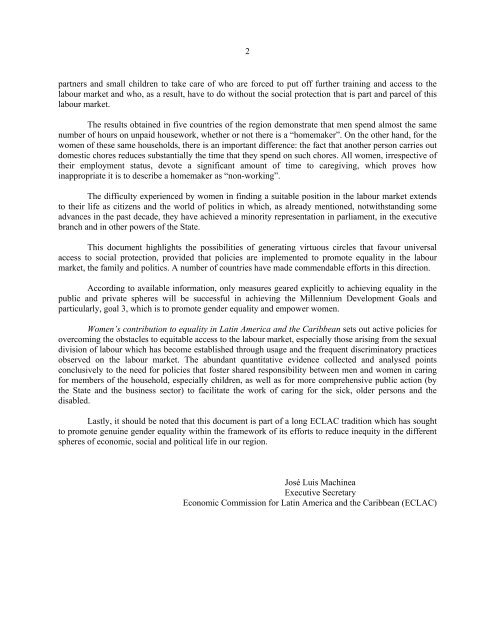Women in Latin America and the Caribbean - Cepal
Women in Latin America and the Caribbean - Cepal
Women in Latin America and the Caribbean - Cepal
You also want an ePaper? Increase the reach of your titles
YUMPU automatically turns print PDFs into web optimized ePapers that Google loves.
2<br />
partners <strong>and</strong> small children to take care of who are forced to put off fur<strong>the</strong>r tra<strong>in</strong><strong>in</strong>g <strong>and</strong> access to <strong>the</strong><br />
labour market <strong>and</strong> who, as a result, have to do without <strong>the</strong> social protection that is part <strong>and</strong> parcel of this<br />
labour market.<br />
The results obta<strong>in</strong>ed <strong>in</strong> five countries of <strong>the</strong> region demonstrate that men spend almost <strong>the</strong> same<br />
number of hours on unpaid housework, whe<strong>the</strong>r or not <strong>the</strong>re is a “homemaker”. On <strong>the</strong> o<strong>the</strong>r h<strong>and</strong>, for <strong>the</strong><br />
women of <strong>the</strong>se same households, <strong>the</strong>re is an important difference: <strong>the</strong> fact that ano<strong>the</strong>r person carries out<br />
domestic chores reduces substantially <strong>the</strong> time that <strong>the</strong>y spend on such chores. All women, irrespective of<br />
<strong>the</strong>ir employment status, devote a significant amount of time to caregiv<strong>in</strong>g, which proves how<br />
<strong>in</strong>appropriate it is to describe a homemaker as “non-work<strong>in</strong>g”.<br />
The difficulty experienced by women <strong>in</strong> f<strong>in</strong>d<strong>in</strong>g a suitable position <strong>in</strong> <strong>the</strong> labour market extends<br />
to <strong>the</strong>ir life as citizens <strong>and</strong> <strong>the</strong> world of politics <strong>in</strong> which, as already mentioned, notwithst<strong>and</strong><strong>in</strong>g some<br />
advances <strong>in</strong> <strong>the</strong> past decade, <strong>the</strong>y have achieved a m<strong>in</strong>ority representation <strong>in</strong> parliament, <strong>in</strong> <strong>the</strong> executive<br />
branch <strong>and</strong> <strong>in</strong> o<strong>the</strong>r powers of <strong>the</strong> State.<br />
This document highlights <strong>the</strong> possibilities of generat<strong>in</strong>g virtuous circles that favour universal<br />
access to social protection, provided that policies are implemented to promote equality <strong>in</strong> <strong>the</strong> labour<br />
market, <strong>the</strong> family <strong>and</strong> politics. A number of countries have made commendable efforts <strong>in</strong> this direction.<br />
Accord<strong>in</strong>g to available <strong>in</strong>formation, only measures geared explicitly to achiev<strong>in</strong>g equality <strong>in</strong> <strong>the</strong><br />
public <strong>and</strong> private spheres will be successful <strong>in</strong> achiev<strong>in</strong>g <strong>the</strong> Millennium Development Goals <strong>and</strong><br />
particularly, goal 3, which is to promote gender equality <strong>and</strong> empower women.<br />
<strong>Women</strong>’s contribution to equality <strong>in</strong> Lat<strong>in</strong> <strong>America</strong> <strong>and</strong> <strong>the</strong> <strong>Caribbean</strong> sets out active policies for<br />
overcom<strong>in</strong>g <strong>the</strong> obstacles to equitable access to <strong>the</strong> labour market, especially those aris<strong>in</strong>g from <strong>the</strong> sexual<br />
division of labour which has become established through usage <strong>and</strong> <strong>the</strong> frequent discrim<strong>in</strong>atory practices<br />
observed on <strong>the</strong> labour market. The abundant quantitative evidence collected <strong>and</strong> analysed po<strong>in</strong>ts<br />
conclusively to <strong>the</strong> need for policies that foster shared responsibility between men <strong>and</strong> women <strong>in</strong> car<strong>in</strong>g<br />
for members of <strong>the</strong> household, especially children, as well as for more comprehensive public action (by<br />
<strong>the</strong> State <strong>and</strong> <strong>the</strong> bus<strong>in</strong>ess sector) to facilitate <strong>the</strong> work of car<strong>in</strong>g for <strong>the</strong> sick, older persons <strong>and</strong> <strong>the</strong><br />
disabled.<br />
Lastly, it should be noted that this document is part of a long ECLAC tradition which has sought<br />
to promote genu<strong>in</strong>e gender equality with<strong>in</strong> <strong>the</strong> framework of its efforts to reduce <strong>in</strong>equity <strong>in</strong> <strong>the</strong> different<br />
spheres of economic, social <strong>and</strong> political life <strong>in</strong> our region.<br />
José Luis Mach<strong>in</strong>ea<br />
Executive Secretary<br />
Economic Commission for Lat<strong>in</strong> <strong>America</strong> <strong>and</strong> <strong>the</strong> <strong>Caribbean</strong> (ECLAC)











